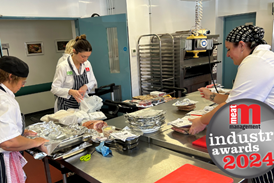The Food Standards Agency (FSA) and Food Standards Scotland (FSS) published a report reviewing UK food standards throughout 2022.

Titled 'Our Food 2022: An Annual Review of Food Standards Across the UK', it is the second report since the UK left the EU and is an "independent and evidence based" annual assessment of food standards across the nations.
It stated that despite inflationary pressures, labour shortages and the war in Ukraine, food standards remained "stable" in 2022. The report identified shortages in food safety roles like vets and food inspectors, which it highlighted will make it more difficult to identify people with the correct skills to deliver food controls.
Supporting food safety in the system
Heather Kelman, chair of FSS, said: “It is encouraging to see that in 2022, amid several significant challenges both here in the UK and further afield, the overall safety and standards of our food has been upheld to the very high standards which we expect.
“However, we must recognise the very significant challenges ahead and the potential problems that a lack of resourcing, specifically within environmental health officer and official veterinarian roles, may cause to the overall food system. It is now more important than ever for those who govern the system, as well as everyone involved in food production, retail and distribution, to work together to ensure food is safe and consumers and trade are protected.
“It is critical that, together, we do everything we can to ensure we have a modernised system of assurance to support businesses that provide safe food for everyone and that the UK's high food standards are maintained, in spite of the cost and workforce pressures we continue to face.”
Professor Susan Jebb, chair of the FSA, said: “The food system across the UK experienced significant challenges throughout 2022, with the rising cost-of-living and inflation impacting grocery bills for consumers, and food businesses feeling the pressure of labour shortages and increased supply chain costs.
“Despite these pressures, I’m encouraged that our report indicates that overall, food standards have remained stable. However, food safety and standards hinge on good procedures and skilled people to ensure that the right checks are carried out. It takes time to recruit and develop these skills and we worry that without specific action to boost the workforce, specifically to recruit more official veterinarians and local authority inspectors, it will not be possible to maintain these high standards in the future.
“Failure to recruit and train professionals to key posts can have reverberations for many years to come. We ask Governments across the UK, and others, to work with us to address these matters in the coming year so that people in the UK can continue to have food they can trust, and the strong reputation of British food abroad is maintained.”
Calling on industry to address issues
The food bodies are calling on Government, local authorities, professional bodies and industry to:
- Address the decline in local authority Trading Standards officers, Environmental Health and Food Law officers to ensure food standards are maintained;
- Tackle the shortage of Official Veterinarians (OVs) to protect animal health and welfare and trade and assure food hygiene is maintained;
- Share more and better-quality information across the food industry to help stop criminal gangs and tackle food crime that costs the UK up to £2 billion per year; and
- Introduce import controls on food imported from the EU to help reduce the risk of unsafe food entering the UK from the EU.
Data in the report showed that the UK veterinary profession has experienced a decline of 27% in newcomers between 2019 and 2022, which the report states will create issues when securing OVs in the future. It also highlights how a lack of OVs will pose risks to animal health and welfare, the potential disruption of food supply and the ability to export products of animal origin.
This story was originally published on a previous version of the Meat Management website and so there may be some missing images and formatting issues.





